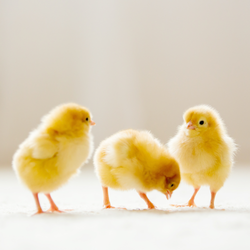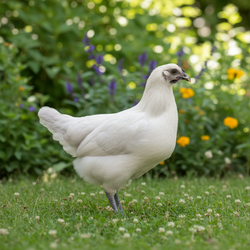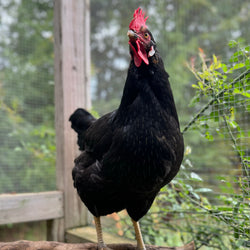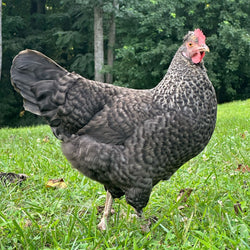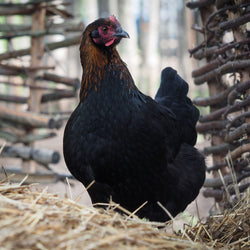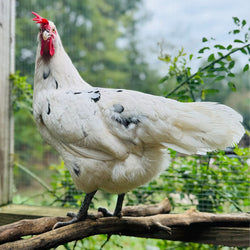page=52/--
Frequently Asked Questions
Here we answer the most commonly-asked questions about ordering, chicken care, and more.
Do ducks and geese make good pets?
Yes, ducks and geese make good pets! But it's important to remember that they are not dogs or cats - or even chickens! And that's some of the fun of keeping them--learning and loving their awesome quirkiness. Here are some reasons ducks and geese make great pets: Ducks and geese are entertaining! In addition to their natural charm, ducks and geese can be trained to play with toys, play games, do tricks, sit in your lap, and more. They may learn to enjoy a good stroke on the back or neck, and some will even pursue you, demanding to be...
Read MoreCan I keep just one duck or goose?
Having a cute duck follow you around the house or a goose fly along beside your car as you run errands--it's a fun idea, right? After all, it's not every day that to see a duck in a truck or a pet goose on the loose. Wouldn't keeping just one waterfowl like this be fun? Well, yes...maybe. It's possible to keep just one duck or goose--especially if it has not grown up with other waterfowl--since on some level, it thinks it is human. Because ducks and geese are very social animals that can imprint on anyone that shows them attention...
Read MoreCan different waterfowl breeds cross-breed?
Yes, it is genetically possible for any breed of duck to cross with any other breed of duck, and any goose breed can also cross with other breeds of geese. We are not aware of any verified, viable crosses between ducks and geese, however. Sometimes a goose will attempt to mate with a duck, or vice-versa, but even if they mate successfully, the resulting eggs would not be fertile. Each breed will likely prefer to mate with other breeds of similar size, but not always. It can be difficult for a larger bird to catch a smaller breed or for...
Read MoreCan ducks and geese be outside during the winter?
Yes! Ducks and geese can be outside during winter! They have a wonderful fluffy undercoating beneath their feathers called "down." Ever had a down jacket? It kept you toasty-warm, right? Ducks and geese get to wear that jacket all the time. Lucky birds, I know!In addition to their down feathers, ducks and geese have a layer of fat beneath the skin that provides even more insulation. Tips for Managing your Ducks and Geese Outside During Winter Shelter: When conditions are the harshest, even the best winter coat may not be enough. If the temperature is going to be below...
Read MoreHow do I introduce new ducks into my flock?
With ducks, the process is usually simpler than when introducing chickens to each other. Normally, you can simply put ducks together and within a few days, they are fully integrated. That being said, make sure you watch them carefully at first. The alpha duck may be aggressive, especially during the spring and summer mating season. If possible, you may want to avoid adding new waterfowl during that time of year. "Welcome to the flock!" If the fighting is excessive, separate the newcomer, but keep the pens beside each other for a few days so they can see each other and...
Read MoreDo ducks and geese have to have swimming water?
While ducks and geese DO need fresh, clean drinking water, and ideally have ready access to a shallow area with "dipping" water (enough for them to dip their heads in to clean their beak, nostrils, and eyes)...they DO NOT require water deep enough for swimming. Ducks and geese love to swim, and they are EXTREMELY cute when they frolic and play in water (don't believe us?...then watch the "Ducklings enjoying bath time!" video in this article), but you are making some headaches for yourself if you provide them with continual access to swimming water. The biggest problem is what to...
Read MoreCan ducks and geese survive on a pond?
Yes--potentially! But before you release a few ducks or geese onto your backyard pond, here are some things to consider: A body of water can only sustain so many bodies! Having too many waterfowl on a pond can damage the pond's ecosystem, creating unhealthy living conditions. In particular, excessive numbers of ducks can speed bank erosion, as they use their bills to dig in the soft areas around the pond in search of food. Likewise, too many geese can defoliate and trample plants growing along the pond's banks. Generally speaking, no more than 8-15...
Read MoreHow do I introduce new geese into my flock?
While geese generally get along well with one another, adding a new goose or gander to your gaggle can be a stressful time for them--and for you!--as they work out the new pecking order. Following the steps we outline here will help the transition go as smoothly as possible. After quarantining the new birds for four weeks, it will be time to integrate them into the flock. Thankfully, Reginald Appleyard (originator of the Appleyard duck breed), an experienced flock-keeper from the past, shared some great advice for handling goose introductions in his book, Geese: Breeding, Rearing, and Management, which was...
Read More







"The Clubhouse" Coop
Easy to assemble and built to last, the Clubhouse Coop is the perfect starter coop for a small flock.

